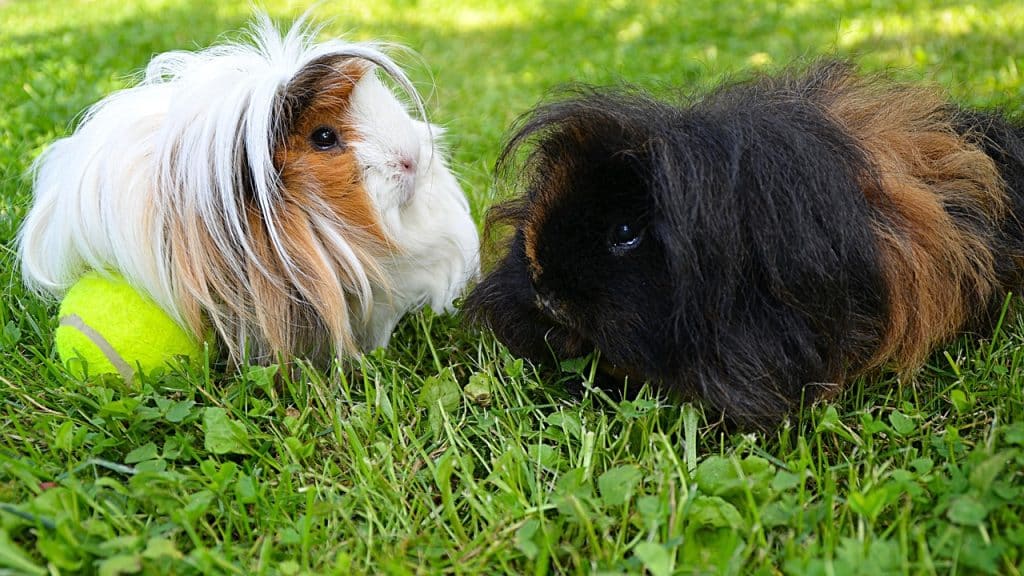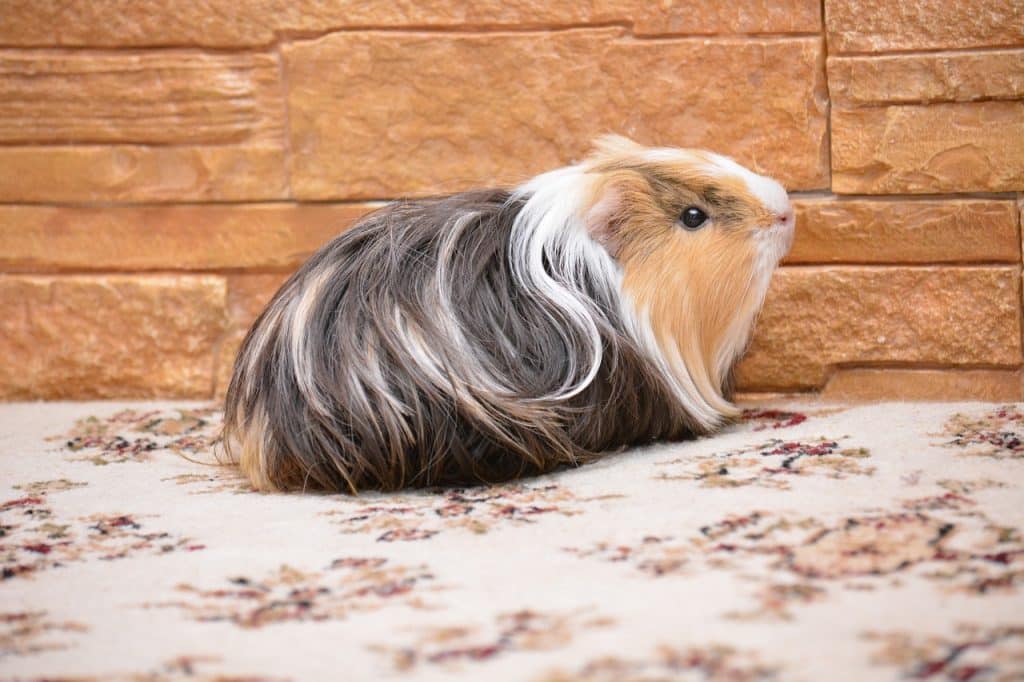
| Length: | 8-12 inches |
| Weight: | 600 to 1200 grams |
| Lifespan: | 4 – 6 Years |
| Colors: | White, black, beige, brindle, cream, roan, albino |
| Temperament: | They are affectionate and sweet and love to be held and petted. |
| The Best for: | Experienced pet lovers |
The Alpaca Guinea Pig, a long-haired breed of guinea pig, is similar to a Peruvian Guinea Pig. It has wavy ends. Their head often has a single rosette, but they can also have multiple rosettes throughout their bodies. They require daily hair care and special diets.
The Alpaca guinea pig, which is an offshoot of the Peruvian guinea pig, is often confused for the Texel. The Alpaca’s bangs are longer and hang forward than the Texel’s. Because of their long fur, Alpaca guinea pigs aren’t suitable for outdoor life.
Alpaca Guinea Pig – Before You Buy…
What is the cost of an Alpaca Guinea Pig?
Alpaca guinea pigs can be very rare and therefore are often expensive. We recommend that you save at least $100 to be able to buy one of these pets. Most Alpaca guinea pigs will go for more than that.
Three Little-Known Facts about the Alpaca Guinea Pig
Let’s take a look at some lesser-known facts regarding the Alpaca Guinea Pig.
1. Their name comes from the South American Alpaca camelid
Alpaca Guinea Pigs are named after the Alpaca Camelid from South America because they have similar hairstyles.
2. Alpaca Guinea Pigs are highly sought after and rare.
Alpaca Guinea Pigs can be extremely rare and fetch high prices on the market. Alpaca guinea Pigs are considered one of the most beautiful breeds due to their curly, thick hair and sparse rosettes.
3. Alpaca guinea pigs need a lot of attention.
Alpaca guinea pigs have long, thick hair that needs to be maintained daily to prevent tangles and debris. Alpaca guinea pig owners will need patience, time, and a soft brush.
Temperament and intelligence of the Alpaca Guinea Pig
Alpaca guinea pigs are calm and affectionate animals that can be friendly with humans and their cagemates. They are gentle and easy to handle. Alpaca guinea pigs are able to navigate through mazes using symbols such as road signs.
Are these Hamsters Good for Families
Yes, Alpaca guinea pigs can be very friendly and great friends for all members of the family. They can be taught tricks and are intelligent. They love being held and petted. Alpaca guinea pigs are great family pets, as long as at least one member does the grooming.
Is this breed compatible with other pets?
The Alpaca Guinea Pig is friendly and can be found cuddling with other small animals. The Alpaca Guinea Pig is not territorial or hostile and will happily share its cage with other animals.
What to know about owning an Alpaca Guinea Pig
Before you buy your Alpaca Guinea Pig, let’s ensure you do all the research.
Food & Diet Requirements
Alpaca Guinea Pigs need a similar diet to any other guinea. They eat a lot of timothy Hay, which you should give them in large quantities at all times. The Small Animal Vet Hospital recommends that they eat 20% of their daily weight in vegetables. You can add some color to your pet’s diet to increase vitamin C. Most vegetables should be green. Hair growth can be assisted by nutrients found in vegetables. A 1/4 cup of pellet food is also necessary for your pet each day. The food must be enriched with vitamin C and free from harmful chemicals.
As an occasional treat, you can give your guinea-pig small amounts of high-quality fruits such as blueberries or strawberries. However, it is important to not introduce too many sugars to the digestive system.
Exercise
Guinea pigs need to be active and get plenty of exercise in order to remain healthy and happy. The RSPCA states that guinea pigs can be active up to 20 hours per day and only sleep in short intervals. They need to be able to move about, walk and explore their surroundings. Animal Humane Society recommends that a cage should be at least 24 inches wide by 35 inches high. However, larger cages are better. We recommend that you purchase the largest possible cage.
All types of Guinea Pigs prefer large open spaces to cages with multiple levels. They are not only less exercise for your pet but can be dangerous for your pet if they fall from one of the higher platforms.
Training
Alpaca guinea pigs are intelligent and easy to train. Your pet and you will get to know one another better by training your guinea pig. This will provide both exercise and mental stimulation. Giving your pet a treat after they finish a task is the best way for them to learn. These tricks can be taught to your Alpaca Guinea Pig.
Litter box
It’s not difficult to teach guinea pigs how to use a litterbox. You can place a litter box in the cage, where they normally relieve themselves. Put timothy and fecal materials in the litter box and wait. Give the Alpaca guinea pig a treat when it uses its litter box. Your guinea pig will learn to use the litterbox and receive a treat if it does.
Get up
It is simple to teach your Abyssinian Guinea Pig to stand. It is easy to teach your Abyssinian guinea pig how to stand. Simply hold a treat over their heads and repeat the phrase “Stand.” Repeat this several times per day until your pet learns the word, action, treat go together trick. After a few days, it should be able to do the trick on its first or second command.
Follow the Commandments
Guinea pigs quickly learn to associate a word and a treat. You can encourage them to call their names and reward them with treats when they approach you. This system can be used to teach them how to roll a ball or walk through hoops.
Grooming
Alpaca guinea pigs have a unique hairstyle that requires special attention. Because the hair is curly and long, it can pick up a lot of debris as it walks around its cage. This debris must be removed by gently brushing your pet’s hair every day. This will help to remove knots and tangles which can lead to painfully matted hair.
When grooming your Alpaca Guinea Pig, use gentle, soft strokes to avoid pulling their hair or causing them pain. To keep your Alpaca guinea pigs in place, it can be helpful to give them something to chew.

Health and Conditions
Alpaca guinea pigs are healthy and can live up to eight years. There are several health issues that can be associated with guineapig.
Pneumonia
Pneumonia can be a serious health problem for your Alpaca Guinea Pig. Many guinea pigs can have bacteria that cause pneumonia over many years, without any symptoms. You should be aware that your pet may have difficulty breathing, not eating, and have watery discharge from their nose and eyes. These symptoms should be reported to your veterinarian immediately.
Diarrhea
Alpaca guineapigs have, as with all guineapigs, a fragile digestive system. This can easily become unbalanced. Unstable digestive systems can cause uncomfortable gas or diarrhea. If your pet experiences diarrhea, weight loss, low body temperatures, or dehydration, it is likely that its intestinal tract is out of balance.
Scurvy
Scurvy is caused by a lack of vitamin A. It’s common in guinea Pigs as they don’t produce vitamin C. Guinea pigs depend on us to provide the right amount of vitamin C to maintain their health. We recommend that you take your pet to the veterinarian if they have a rough coat, diarrhea, or a reluctance of walking.
Urinary Problems
Urinary tract problems are another problem that affects many Guinea Pigs. Bladder stones, which can sometimes become stuck in the urethra and cause more pain or even death, are the most common problems. Bladder stones are usually caused by high calcium intake. Your vet should be notified if you notice bloody urine or frequent urination.
Are Alpaca Guinea Pigs uncommon?
This guinea pig breed is exceedingly uncommon and hence quite valuable. Many guinea pig enthusiasts believe that Alpacas are among the most gorgeous guinea pigs. They can have a variety of fur hues.
Are Alpaca guinea pigs friendly?
Alpaca guinea pigs are often kind and loving, and they like the company of other guinea pigs! They’re pack animals, so having a partner or two (or more) would be perfect for them not just to keep them company, but also to increase brain activity and encourage them to be active in general.
What is the softest guinea pig?
The Silkie guinea pig, sometimes known as the Sheltie, has long fur that grows backward. It is recognized for being one of the gentlest and most laid-back breeds. While Silkies make fantastic companions, it is important to note that their lengthy fur requires frequent grooming.
Is it inhumane to keep guinea pigs outside?
Guinea pigs may live indoors or outdoors as long as they have adequate space and you can maintain them at a reasonable temperature in the summer heat or terrible winter weather. You may also keep your guinea pigs in a heated outhouse, a car-free garage, or a shed.
Do guinea pigs allow you to pet them?
Petting Zones for Guinea Pigs Some general guidelines to follow till you figure out what your guinea pigs like. Be delicate and move gently. Pet using just one or two fingers. Never sneak up on a guinea pig or pet it when it is sleeping.
How much does an Alpaca guinea pig cost?
Long-haired alpaca, the most appealing: $45. Abyssinian, the friendliest: $50. American, a popular shorthaired breed: $25. Peruvian, a long-haired breed, costs $40.
How long do pet alpacas live?
15 – 20 years Alpacas in the United States can live for 15 to 20 years if properly cared for. Alpacas in their native Andes have a substantially shorter lifetime. This is because the animals are employed in the terminal market when the fiber quality begins to deteriorate.
Do guinea pig bites hurt?
Guinea pigs are calm creatures that seldom bite without reason. They frequently mouth their owners while being held, trying to discover whether you’re edible! These are not painful bites. Curiosity, not hostility.
What is the rare guinea pig breed?
The Santa Catarina guinea pig is one of the world’s rarest animals, with an estimated population of 42 individuals.